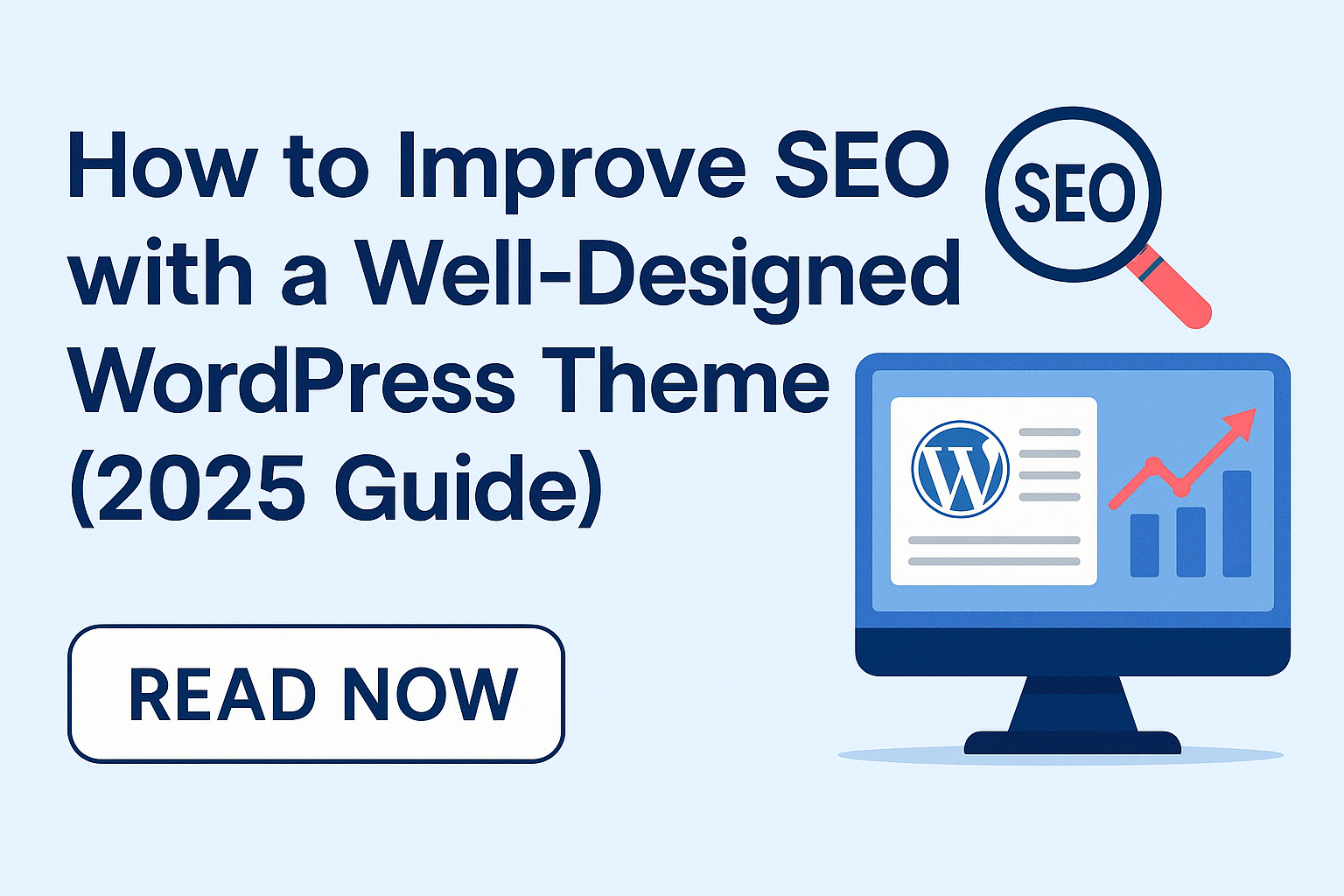
Introduction
When it comes to SEO, most people focus on content and backlinks. But did you know your WordPress theme plays a critical role in your site’s SEO performance? In fact, the right theme can help your site load faster, look better on mobile devices, and rank higher in search engines.
In this guide, we’ll show you how a well-designed WordPress theme can supercharge your SEO—and what to look for when choosing one in 2025.
Why Your WordPress Theme Matters for SEO
Search engine optimization isn’t just about keywords anymore. Google considers site speed, mobile-friendliness, UX, and core web vitals—all of which are directly impacted by your theme.
Here’s how your WordPress theme influences SEO:
- Code Quality: Bloated or outdated code slows down your site.
- Responsive Design: Mobile usability is a Google ranking factor.
- Speed Optimization: Faster-loading sites rank better and convert more.
- Structured Data: Clean code helps search engines understand your content.
1. Mobile-First Design is No Longer Optional
More than 60% of web traffic now comes from mobile devices. Google uses mobile-first indexing, meaning it evaluates your mobile site first when ranking.
✅ What to Look For:
- Responsive layout on all devices
- Optimized font sizes and spacing
- Clickable elements spaced properly
- Lightweight image handling on mobile
Tip: Test your theme on Google’s Mobile-Friendly Test Tool.
2. Site Speed: Faster = Higher Rankings
A fast-loading site is essential for SEO and user experience. Themes with too many animations, scripts, or plugins can bog your site down.
✅ Choose a theme that:
- Loads in under 2 seconds
- Avoids unnecessary JavaScript/CSS
- Supports lazy loading for images
- Is compatible with caching plugins
Bonus: Use tools like GTmetrix or PageSpeed Insights to test theme performance.
3. Clean, Semantic Code Helps Search Engines Crawl
Themes built with clean, semantic HTML5 structure help search engines better understand your content hierarchy.
✅ Look for:
- Proper heading structure (H1, H2, H3)
- Schema.org markup for structured data
- Accessibility best practices (ARIA labels, keyboard navigation)
Pro Tip: Use Chrome DevTools or Lighthouse audit to inspect your theme’s structure.
4. SEO-Ready Out of the Box
A good theme will support your SEO efforts from the start. That includes things like:
- Integration with SEO plugins (like Yoast SEO or RankMath)
- Open Graph tags for social sharing
- Built-in breadcrumbs
- Customizable meta titles and descriptions
✅ Themes that mention “SEO-optimized” in their description should still be tested, not just trusted blindly.
5. Lightweight and Minimalist Design
Less is more when it comes to SEO-friendly themes. A cluttered theme slows down your site and confuses visitors.
✅ Opt for:
- Minimalist design
- No bundled plugins you don’t need
- Built-in performance options (like script loading toggles)
Themes like Astra, GeneratePress, and your own [Your Theme Name] are great examples of fast, lightweight themes optimized for performance.
6. Regular Updates and Developer Support
An outdated theme can lead to compatibility issues and security holes—both of which can hurt your SEO.
✅ Pick a theme that:
- Is actively maintained
- Has a changelog with regular updates
- Offers support or a community forum
Tip: Check the “Last Updated” date on the theme’s marketplace listing or website.
7. Built-in Accessibility Improves SEO and UX
Google cares about user experience, and accessibility is a huge part of that. An accessible theme makes your site usable for more people and easier for search engines to index.
✅ Look for themes that:
- Use proper alt tags and ARIA labels
- Have keyboard navigation support
- Follow WCAG standards
8. Customization Without Code Bloat
You want to customize your site, but not at the cost of SEO. Some themes offer endless options but inject dozens of scripts for each tweak.
✅ Find themes that:
- Offer layout flexibility via the WordPress Customizer
- Support block-based design (Gutenberg or Full Site Editing)
- Don’t require a page builder unless necessary
Bonus: Gutenberg-optimized themes often perform better than Elementor-heavy designs.
Conclusion: Choose an SEO-First WordPress Theme
Your theme isn’t just a design choice—it’s a foundational SEO decision. Choosing a well-designed, SEO-optimized WordPress theme can make the difference between ranking on page 10 or page 1.
If you’re serious about growing your online presence in 2025, invest in a theme built for speed, structure, and search.

